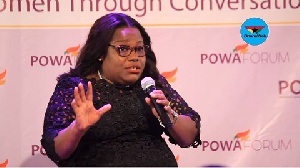Former Gender, Children and Social Protection Minister, Nana Oye Lithur is advocating for maximum participation of the Ghanaian woman in politics and governance, this she says will extensively, reduce the canker of corruption in the country.
Speaking on the prospects of the Ghanaian woman in governance at the POWA forum, Mrs. Oye Lithur indicated that “the future is very bright”.
According to her, women have a bigger role of promoting accountability and transparency in governance, which cannot be exploited to its full potential until they are given prominence in public offices. She emphasized the importance of recruiting and nurturing young females such that they are empowered to take up leadership positions when presented with the opportunity and are able to exude confidence and morality in the dispensation of their duties.
“We need to also look at female participation when they get into governance and look at women in local government because it is from there that we can nurture them to parliament and other public offices so I am very positive the future looks bright. We need to identify young women and like what the political parties are doing, we have the TEIN and the TESCON, these are breeding grounds where we can identify young women and nurture them and train them. So we older women have a responsibility so it is positive.
Mrs. Oye Lithur projected a much better Ghana with women in control of affairs particularly regarding issues of politics and power. Citing a research done by the World Bank, she indicated that women have a higher chance of reducing embezzlement and other vices in governance than men do.
“We will get there and women will rule Ghana and you’ll see a much positive Ghana."
"In fact the World Bank has researched, more women in public offices, less corruption. So the more Ghanaian women you vote for and elect in public office, the less corruption we’ll see in Ghana”.
The Progressive Organisation for Women’s Advancement (POWA) forum came off on October 31 in Accra.
The forum among other things, focused on women empowerment and the role of the Ghanaian woman in society.
General News of Wednesday, 1 November 2017
Source: www.ghanaweb.com

















